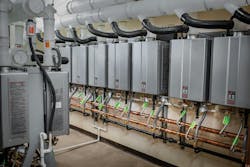Propane tankless water heaters conserve water and energy
Water heating is typically the largest or second-largest energy use in multifamily buildings and single-family homes. The average household uses 64 gallons of water each day, according to the U.S. Energy Information Administration.
Most property management professionals want to conserve water, especially those responsible for paying the utility bills for multifamily properties. Construction professionals who are well-versed in efficient, sustainable water heating solutions will be able to better serve this customer base and stand out from the competition.
Propane tankless water heaters offer benefits over other options including reduced energy costs, lower total cost-of-ownership, and a long service life. And due to the technology’s energy-efficient design, propane tankless systems eliminate standby energy loss from the tank and ultimately help reduce hot-water waste in residential homes and multifamily buildings.
WHY TANKLESS WATER HEATERS?
Tankless water heaters, also known as on-demand or instant water heaters, have become increasingly popular because of their space-saving design and energy-efficient operation. These systems provide hot water only when it is required, eliminating the need for a storage tank, which uses energy continuously to heat the water even when it’s not being used. This means customers aren’t wasting energy heating water when they don’t need it.
A tankless unit’s compact size saves roughly 12 sf of floor space compared with storage tank systems, which is a huge benefit in tight floor plans like apartment and condominium projects. Their compact size and direct-vent design—whereby the air for combustion is ducted directly to the unit from outdoors—allow flexibility in choosing the installation location. Tight spaces like closets and small mechanical rooms become options and with the ability to use common vents chases don’t need to be as large.
Moreover, these units can be installed outdoors in many areas. And for buildings with larger needs, multiple tankless units can be installed together to meet demands for central hot water distribution and work well with recirculating pumps. To reduce the amount of water needed to “empty” the lines and get hot water to the faucet, small circulation pumps can be installed at the sink to return that cold water to the unit instead of sending it down the drain.
WHY PROPANE?
Whether installed in new buildings or as replacements to existing water heating systems, propane tankless systems also offer the versatility and scalability to serve any residential building, from smaller three GPM systems (~140 kBtu/h) to multiunit combinations of eight to nine GPM systems (199 kBtu/h) to commercial units topping 1mil kBtu/h.
Propane tankless models offer energy efficiency, affordability, and reduced emissions.
Unparalleled performance. Propane tankless water heaters provide an endless supply of hot water, averaging over 200 gallons per hour based on the listed models in the AHRI Certified Products Database.
Energy efficiency—and reduced energy costs. A propane tankless water heater transfers propane’s thermal energy into hot water by up to a 0.98 Energy Factor (EF). To achieve such high efficiency ratings, many propane tankless systems use a condensing design, where additional thermal energy is extracted from the combustion gases to preheat incoming water, increasing overall system efficiency.
With an Energy Factor as high as 0.98, propane tankless systems operate very efficiently and therefore have relatively low fuel consumption and costs. In fact, propane tankless water heaters have the lowest annual cost of ownership in mixed and cold U.S. climates when compared with electric water heaters, heat pump water heaters, and heating oil-fueled water heaters, according to an analysis from Newport Partners, LLC (“An Evaluation of Energy, Economics, and Emissions”). Propane tankless systems can save roughly $150 to $200 a year compared with typical electric storage tank water heaters or heating oil systems.
Clean, low-emissions operation. Except for water heaters powered entirely by renewable energy, all systems will have some environmental impact linked to their operations in the form of carbon emissions, but propane offers a low-emissions solution—which is key for projects keeping an eye on their carbon footprint.
Propane tankless systems produce roughly half the carbon emissions of electric storage tank systems, according to an energy and environmental analysis of different energy sources by Newport Partners, LLC. Propane models can produce up to 61% less greenhouse gas emissions, 47% less nitrogen oxide (NOx) emissions, and 91% less sulfur (SOx) emissions than electric-powered storage water heaters.
For more about propane-powered water heating, visit Propane.com/Water-Heating.
ABOUT THE AUTHOR
Bryan Cordill ([email protected]) is director of residential and commercial business development for the Propane Education & Research Council.
